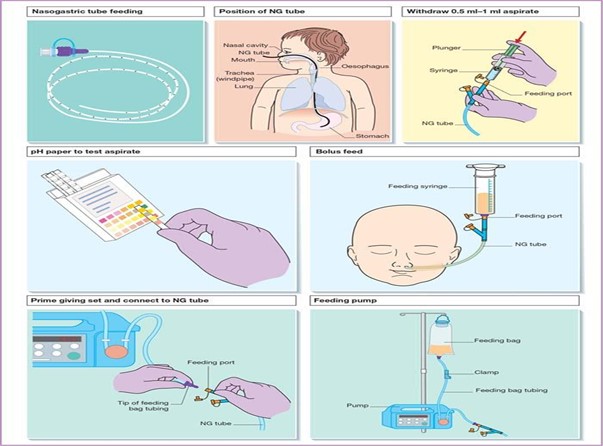The charge nurse observes a newly hired nurse who is preparing to insert a nasogastric tube. Which action by the charge nurse takes priority?
Demonstrate correct measurement of the tube insertion length.
Remind the nurse to apply lubricant to the tube before insertion.
Confirm that the nurse has auscultated the client's bowel sounds.
Elevate the head of the bed before the nurse inserts the tube.
The Correct Answer is A
Choice A
Demonstrating correct measurement of the tube insertion length is the first priority. Inserting a nasogastric tube to the appropriate length is crucial for ensuring that the tube reaches the stomach and is not inserted too far. Incorrect insertion length can lead to complications, discomfort, or potential harm to the patient. Therefore, demonstrating and ensuring the correct measurement of the tube insertion length takes priority.:
Choice B
Reminding the nurse to apply lubricant to the tube before insertion is not first priority. Applying lubricant helps ease the insertion process, but it is not the most critical step to prioritize initially.
Choice C
Confirming that the nurse has auscultated the client's bowel sounds is not the first priority. Bowel sounds assessment is important to ensure proper placement, but this step can be done after ensuring the correct measurement of the insertion length.
Choice D
Elevating the head of the bed before the nurse inserts the tube is not the first priority: Elevating the head of the bed helps facilitate the passage of the tube into the stomach, but it is not the first priority in this context.

Nursing Test Bank
Naxlex Comprehensive Predictor Exams
Related Questions
Correct Answer is C
Explanation
Choice A
Urinary ketones are not most important. Monitoring urinary ketones can provide information about the utilization of glucose and fat as energy sources. However, it is not the primary lab value to monitor in TPN administration.
Choice B
Serum protein is not most important. Monitoring serum protein levels is important to assess nutritional status, but it might not be as immediate a concern as serum osmolarity.
Choice C
Serum osmolarity is the most important. When caring for a client receiving total parenteral nutrition (TPN), monitoring serum osmolarity is most important. TPN is a highly concentrated solution containing various nutrients, and it is infused directly into the bloodstream. Serum osmolarity reflects the concentration of particles (such as electrolytes, glucose, and other solutes) in the blood. Monitoring serum osmolarity is crucial to prevent complications related to fluid and electrolyte imbalances that can arise from the administration of TPN.
Choice D
Capillary glucose is not the most important. Monitoring capillary glucose levels is important, especially in clients receiving TPN with added glucose. Hyperglycaemia is a potential complication of TPN. While glucose monitoring is important, it is secondary to monitoring serum osmolarity, which encompasses a broader range of solute concentrations.

Correct Answer is B
Explanation
Choice A
Potatoes are incorrect. Potatoes are high in carbohydrates and can cause a rapid increase in blood sugar levels, so they are not the best choice for someone with diabetes trying to avoid refined sugars and carbs.
Choice B
Avocado is correct. Avocado is a good choice for someone with Type 2 diabetes who wants to avoid refined sugars and carbohydrates. Avocado is a healthy source of monounsaturated fats, fibre, and various vitamins and minerals. It has a low glycaemic index and doesn't significantly raise blood sugar levels, making it a suitable option for people with diabetes.
Choice C
Grapes is incorrect: Grapes are a fruit with natural sugars, and although they contain fibre, they can still cause spikes in blood sugar levels.
Choice D
Pretzels are incorrect. Pretzels are usually made from refined flour and are high in simple carbohydrates, causing rapid spikes in blood sugar levels. They are not a good choice for someone with diabetes aiming to avoid refined sugars and carbs.
Whether you are a student looking to ace your exams or a practicing nurse seeking to enhance your expertise , our nursing education contents will empower you with the confidence and competence to make a difference in the lives of patients and become a respected leader in the healthcare field.
Visit Naxlex, invest in your future and unlock endless possibilities with our unparalleled nursing education contents today
Report Wrong Answer on the Current Question
Do you disagree with the answer? If yes, what is your expected answer? Explain.
Kindly be descriptive with the issue you are facing.
